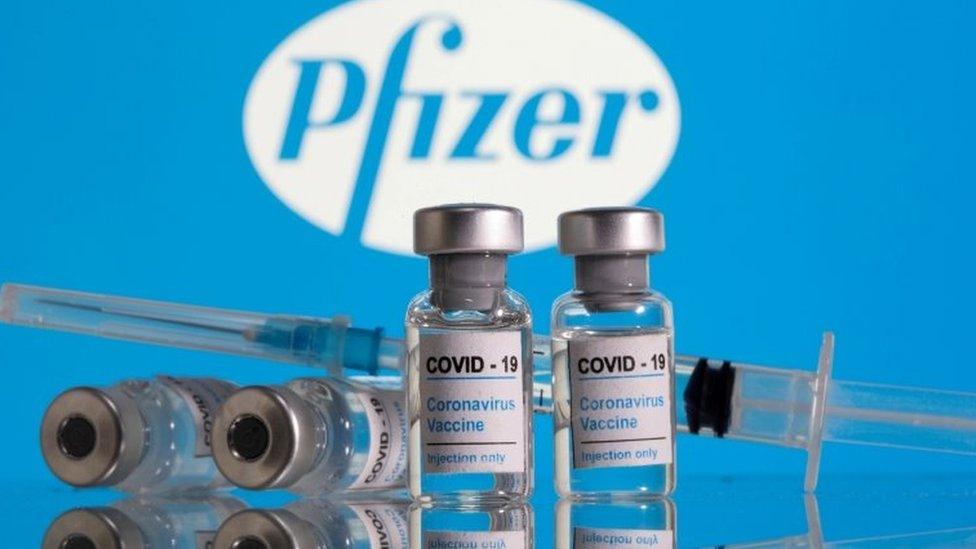Covid: US backs waiver on vaccine patents to boost supply
- Published
- comments
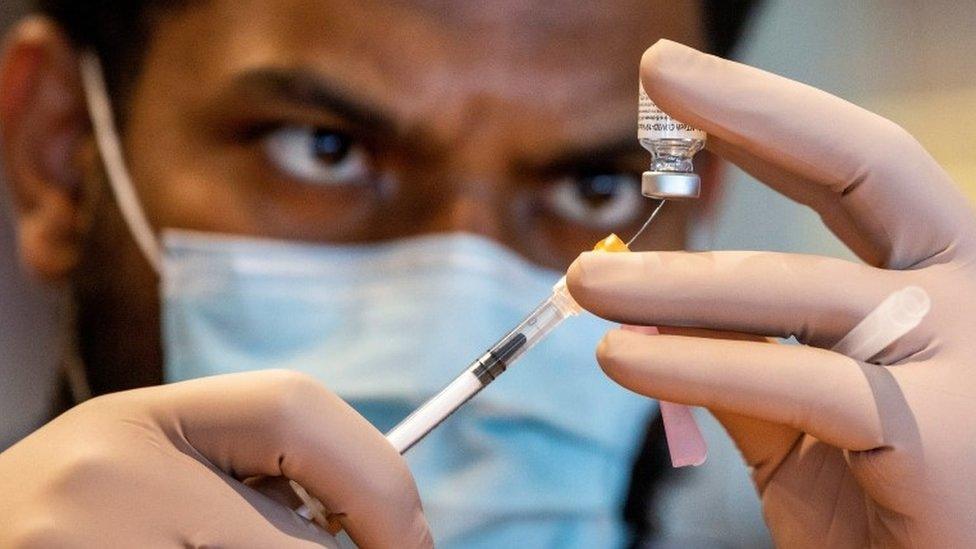
The US has thrown its support behind a move at the World Trade Organization (WTO) to temporarily lift patent protections for coronavirus vaccines.
Advocates of the move say it would increase global vaccine production, but drugs manufacturers argue it will not have the desired effect.
Critics say it strips financial rewards from cutting-edge drug developers.
The decision by US President Joe Biden comes amid pressure from Democrats in his party to remove patent protections.
In announcing the new policy, US Trade Representative Katherine Tai said that "extraordinary times call for extraordinary measures".
Ms Tai said the US would now embark on negotiations at the WTO to try to secure the waiver, but warned this could take time.
India and South Africa were the leading voices in a group of about 60 countries which for the last six months has been trying to get the patents on vaccines set aside.
One hundred of the WTO's 164 states are said to be in favour, and a panel on intellectual property is expected to discuss the issue next month.
If approved, supporters say, the waiver would allow production of vaccines to be ramped up and provide more affordable doses for less wealthy countries.
The countries in favour of the move met with strong opposition from the previous US administration of Donald Trump, the UK and the EU. Mr Biden had proposed a waiver during the 2020 presidential election campaign.
What is intellectual property?
Intellectual property describes creations, such as inventions, which are protected by patents, copyrights and trademarks. These prevent copying and allow the originator to be financially rewarded.
Patents give innovating firms a short-term monopoly on production to cover the costs of development and encourage investment.
Biotech firms argue that such protection has provided incentives to produce Covid vaccines in record times.
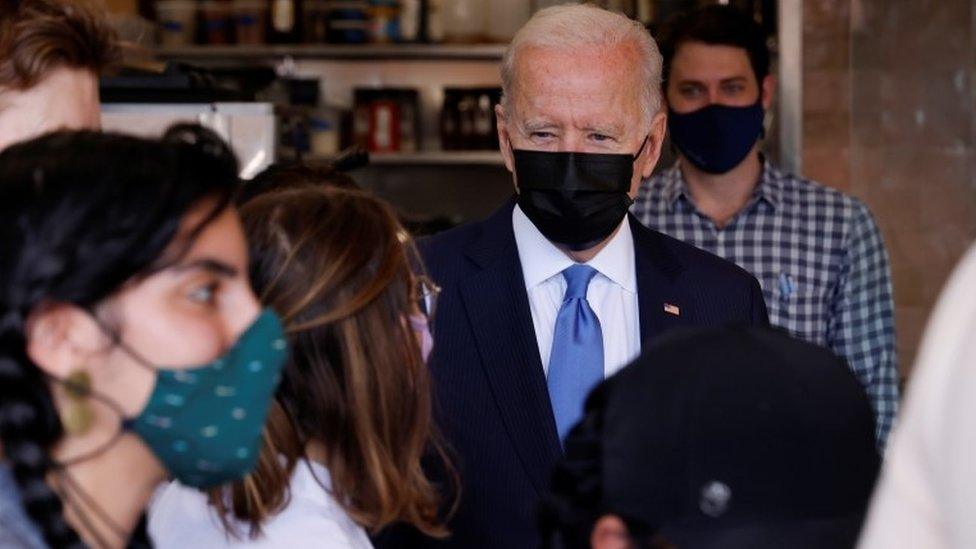
Biden backed a waiver during the 2020 presidential campaign
What would the waiver mean?
Many developing countries have argued that rules requiring countries to protect patents and other forms of intellectual property are an obstacle to increasing the production of vaccines and other products needed to tackle the pandemic.
Tedros Adhanom Ghebreyesus, head of the WHO, called the US decision "historic" and said it marked "a monumental moment in the fight against Covid-19".
The medical NGO, MSF - Doctors Without Borders - said the move would "increase sufficient and timely access to these lifesaving medical tools as Covid-19 continues to ravage countries across the globe."
Calls for a vaccine patent waiver come as lower income countries face acute vaccine shortages.
MSF points out that many of the low-income states where it operates "only received 0.3 percent of global Covid-19 vaccine supply while the US has secured enough doses to protect its entire population".
India, which was shipping vaccines to other countries, has now had to cancel exports as it grapples with surging coronavirus cases and falls behind on its vaccination targets.
But pharmaceutical companies have voiced their opposition to a waiver, insisting that patents are not the primary obstacle, and cautioned that the move could stifle innovation.
The head of the International Federation of Pharmaceutical Manufacturers and Associations, Thomas Cueni, told the BBC's Today programme that technology transfer should not be enforced.
"I'm deeply concerned if you hand this over and allow companies to try to get it done the right way, safe and high quality, you could compromise the quality and safety of vaccines which we see now and it would be disruptive."
He said Western pharmaceutical companies were already sharing technology on a voluntary basis.
"The bottlenecks right now are trade barriers, preventing companies from moving their goods from one country to another. It is shortages and scarcity in the supply chains, which need to be addressed. And it is also right now the disappointing unwillingness of rich countries to early share doses with the poor countries.
"None of this is addressed with the patent waiver."
Dr Amesh Adalja, senior scholar at the Johns Hopkins Center for Health Security, told the Reuters news agency that the waiver "amounts to the expropriation of the property of the pharmaceutical companies whose innovation and financial investments made the development of Covid-19 vaccines possible in the first place".
How to tell a Covid-19 vaccine sceptic the facts


Nobody is protected until everyone's protected: on that world and business leaders are agreed.
But pharmaceutical companies have called the decision by the US to back the sharing of secret recipes for vaccinations short-sighted, claiming it is understanding the production process that is the real challenge, particularly when it comes to the new breed of mRNA vaccines - such as Pfizer and Moderna - as well as the availability of raw materials.
It is, they say, akin to handing out a recipe without sharing the method or the ingredients, and could lead to quality issues and less efficient production.
Instead, the UK and the EU have favoured a system of licensing, whereby know-how is shared and there is more oversight. It is already being done on some cases on a voluntary basis - such as the tie up between Oxford AstraZeneca and the Serum Institute of India. And that licensing can be made compulsory, although the pharmaceutical companies could then be eligible for compensation.
Some trade specialists have speculated that the US might be hoping that, by backing a lifting of patents, manufacturers might be more open to sharing expertise voluntarily - or at least, for a reduced charge.

What has the reaction been?
European Commission President Ursula von der Leyen said "the EU is also ready to discuss any proposals that address the crisis in an effective and pragmatic manner".
French President Emmanuel Macron has changed his position, now saying he is "absolutely in favour".
A UK government spokesperson said the UK was "working with WTO members to resolve this issue" and was "in discussions with the US and WTO members to facilitate increased production and supply of Covid-19 vaccines".
The head of the World Health Organization called the US announcement a "monumental moment" in the fight against Covid-19.
The prospect of a waiver hit shares in the pharmaceutical companies Pfizer, Moderna and Novavax.
Some experts say pharmaceutical companies would also need to share know-how, such as production techniques, with poorer countries to have any real beneficial effect.
Licensing agreements are another way of boosting production.
One of the largest Covid vaccine producers is the Serum Institute of India which manufactures the Oxford-AstraZeneca jab under a licensing agreement with the Anglo-Swedish company.
- Published5 May 2021
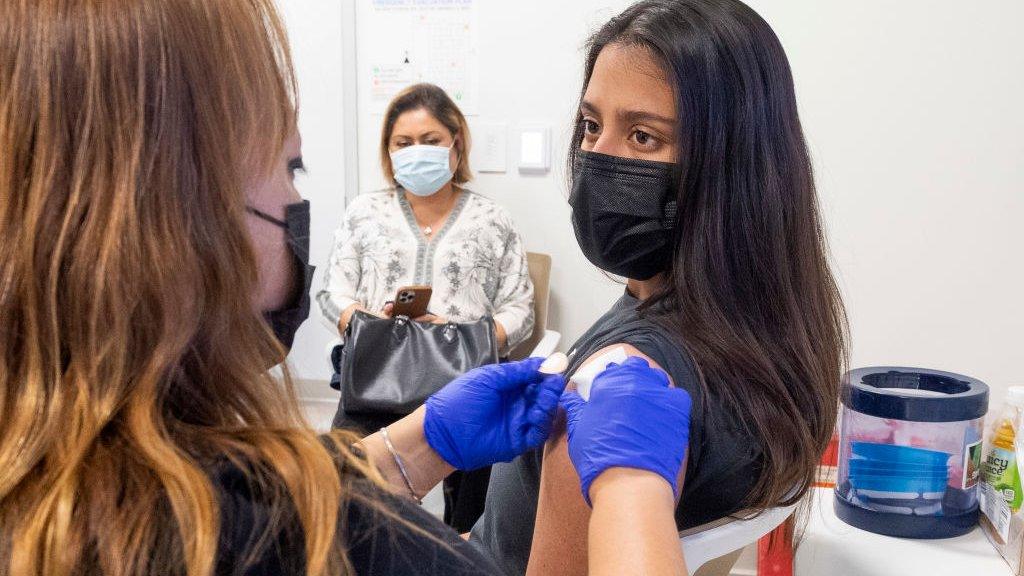
- Published1 April 2021
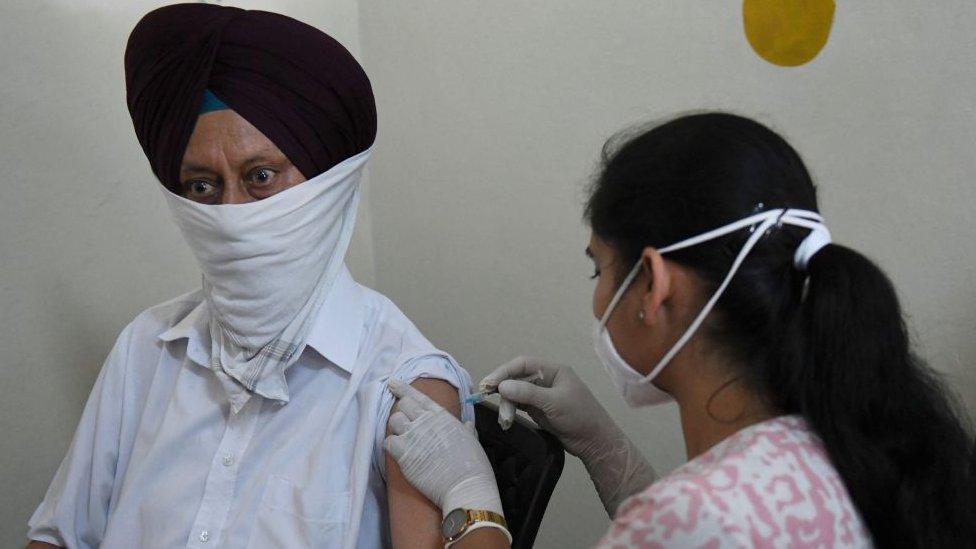
- Published5 May 2021
